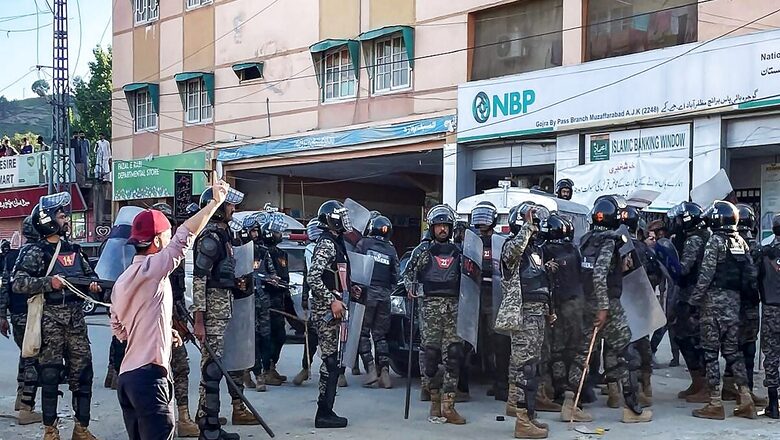
views
Pakistan-occupied Jammu and Kashmir (PoJK) is undergoing significant turmoil, with normal life severely disrupted due to the violent suppression of protests by Pakistani security forces. The region is on edge, with mobile and internet communications down and educational institutions indefinitely shut. The situation escalated dramatically in the past week, particularly following the pre-emptive arrests of local leaders by the Pakistani police to prevent their long march to the regional capital, Muzaffarabad, on May 11.
Ever since, the Pakistani Rangers have killed over half a dozen civilians and wounded hundreds of others across different districts of the occupied territory.
The protests, which have taken the shape of a non-operation movement and are among the largest and most intense in recent years, are fueled by widespread discontent over the Pakistani government’s policies on basic amenities, including electricity tariffs, subsidised wheat, and a lack of development. This incident has refocused attention on the long-standing colonial and imperial policies enforced by Pakistan in PoJK, which has exacerbated people’s frustration and anger.
The persistent protests underscore the broader issues of neglect and exploitation by Islamabad towards Muzaffarabad. The region “has long been ignored, exploited, looted and plundered by Pakistani military dictatorships and governments” and “lacks basic and essential infrastructure like mobile connectivity, roads, healthcare and education. This was a lava brewing that may be finding a way to erupt now.” The Pakistani government’s failure to address the basic needs of the people in PoJK is not just a matter of poor governance but also a reflection of its colonial approach to the region.
For over a year, PoJK has witnessed protests demanding essential services from the indifferent Pakistani government and its local toothless clientele administration in Muzaffarabad. The unrest began in May 2023 when residents of Rawlakote in the Poonch division protested against increased electricity charges and the withdrawal of subsidies on wheat and other staples adding to people’s misery amidst rising inflation in this severely underdeveloped region. The civil unrest spread to the whole of PoJK, bringing to the fore the decades-long systematic oppressive policies of the Pakistani government.
Ever since, people have been engaged in a sustained protest against the government, seeking not only autonomy over their resources but also access to basic human rights and life essentials.
The situation has been compounded by recurrent interference by the Pakistani government and its military establishment in the governance affairs of PoJK. There is a consensus amongst all the local stakeholders that the PoJK government works under the direction of a two-star military general of the Pakistan Army’s Murree-based 12 Infantry Division in Punjab. According to a Human Rights Watch (HRW) report on POJK, “The corps commander in Murree is known to summon the Azad Kashmir prime minister, president and other government officials regularly to outline the military’s views on all political and governance issues in the territory.” This was demonstrated by the Pakistan military’s overnight coup to oust the elected government of Sardar Tanvir Ilyas in April 2023 and install its “puppet” administration under Chaudhry Anwarul Haq in Muzaffarabad to secure its interests.
This recurrent meddling by Pakistan is facilitated by PoJK’s constitutional arrangement with Islamabad under the ‘Azad’ Jammu Kashmir Interim Constitution Act of 1974. While the Act provides for the region’s nominal self-governance, its Section 56 nullifies everything by empowering Islamabad with unchecked powers to “dismiss any elected government in Azad Kashmir irrespective of the support it may enjoy in the AJK Legislative Assembly.” This provision reduces the PoJK government to an entity functioning “by the Pakistanis for Pakistan,” as it establishes the ‘Azad’ Kashmir Council, which operates under Pakistan’s prime minister and holds unchallenged authority over 52 subjects, including everything of importance to everyday life of people and the region.
Additionally, Pakistan deputes its civil services and police officers to oversee the administration in the region to ensure the compliance of the local government. As such, this administration is seen as merely an extension of Islamabad’s control, lacking genuine concern for the region’s welfare. This has contributed to the growing resentment among the common people against the local administration.
The manner in which successive Pakistani governments have handled PoJK and pursued discriminatory policies relegates its residents to second-class citizens, demonstrating Islamabad’s colonial approach. This is evident in the disproportionate diversion of PoJK’s significant resource contributions, particularly hydroelectric power, to Pakistan’s Punjab province, while locals endure extended load-shedding and inflated electricity tariffs. Had that not been so, people would not have been forced on the roads over basic life essentials for nearly a year now, with the Pakistani administration demonstrating its disdain and indignation for the people through its indifference.
It is a shame that the Joint Awami Action Committee (JAAC), constituted of members from all districts of POJK, has to negotiate basic services and essentials that have been denied by Islamabad to the locals over the years, in its 10-point Charter of Demands with Pakistan’s federal government. For instance, some of the specific demands raised in the charter include subsidies on 48 daily-use products/groceries like wheat flour, 10 per cent free electricity generated by the Pakistani government in PoJK, transferring of ownership of all hydroelectric projects to PoJK government, establishment of a National Grid Station in the region to curb load-shedding, extension of 4G internet services, tax exemptions, and refurbishment of basic infrastructure damaged by Pakistan’s resource exploitation of the region.
Take the case of hydel power projects and power scarcity in PoJK. Pakistan generates nearly 3500 MWs of its total 8000 MW of hydel power from PoJK, mainly from the Mangla Dam (1000 MW) and the Neelum-Jhelum project (969 MW) power projects. Despite this, all electricity generated in PoJK is transferred to the National Power Grid in Punjab by Pakistan’s Water and Power Development Authority (WAPDA), which runs these projects. Instead of supplying the required power to PoJK residents at nominal prices as a matter of right, Pakistan sells it at highly inflated rates as per the formula of its National Electric Power Regulatory Authority (NEPRA), even as the region suffers from extended load-shedding. As such, while WAPDA produces electricity from PoJK projects at PKR 2 per unit, the same is sold to the locals at PKR 30 per unit.
This is utterly spurning as this exploitation is exacerbated by the ecological price PoJK has paid, including displacement and environmental degradation caused by these projects, to sustain Pakistan’s national power requirements. For instance, the Mangla Dam project, which was commissioned in 1967, forced the displacement of hundreds of thousands of residents in the Mirpur division, with nearly 180 villages deluded and wiped out forever. In the case of the Neelum-Jhelum project, Pakistan wrought ecological disaster in Muzaffarabad by changing the course of the Neelum and Jhelum rivers, exacerbating not only the issue of clean water availability in the capital division but also affecting the limited agricultural avenues.
Besides, the Pakistani government has not paid the agreed-upon water royalty to the PoJK government in the last 56 years of Mangla Dam’s functioning, effectively sitting over billions that the local government could have used to sponsor the development in the region. As such, while its waters light up the whole of Pakistan, especially Punjab province, PoJK is subjected to darkness by the colonial approach of Islamabad. The Pakistani government and its military establishment should be thankful that the JAAC’s Charter of Demands asks for a mere 10 per cent of free electricity from the power projects in PoJK, which is the region’s peak demand. This is the least that the Pakistan government could return to the people to start with, given the level of resource exploitation it has engaged in the region for the last seven decades without any accountability ever.
Moreover, the Pakistani government has weaponised the supply of wheat, a staple food in PoJK. As local wheat production is low due to the region’s topography, PoJK depends on external supply. A mere 40 kg wheat bag is sold at over PKR 3100, which is beyond the economic means of much of this impoverished region that has a quarter of the population reeling under multidimensional poverty. The Pakistani government has gradually withdrawn subsidies for essential foods, forcing residents to pay unaffordable prices amidst the high inflation and broader economic distress.
Therefore, the present protests in Pakistan-Occupied Jammu and Kashmir assume significance as this is the first time that the people have defied the enforced silence of the Pakistani military, which effectively rules the region. From enduring tight yet selective control over their freedom of expression in this highly militarised region that criminalised any criticism of the Pakistani government or its policies towards the region, this awakening is a welcome step. It signifies in clearest terms that there is a growing awareness among the people of PoJK about their exploitation by the Pakistani state, and the time is near when the region shall break free from the yoke of Pakistani occupation.
The writer is an author and columnist and has written several books. His X handle is @ArunAnandLive. Views expressed in the above piece are personal and solely that of the author. They do not necessarily reflect News18’s views.




















Comments
0 comment